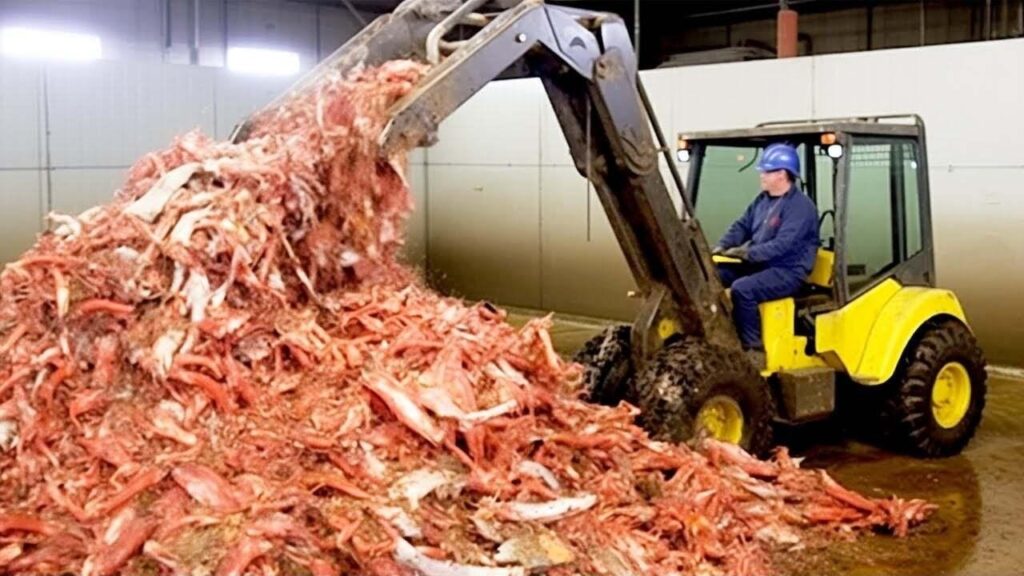1. Chicken Nuggets
Chicken nuggets, prized for their convenience and crispiness, are made from mechanically separated meat, a paste-like substance obtained by forcing leftover chicken carcasses through a sieve under high pressure.
This method includes cartilage, skin, and other less desirable parts. After this meat is mixed with fillers, preservatives, and artificial flavors, the nuggets are formed, breaded, and then fried or baked. Their high sodium content, unhealthy fats, and potentially harmful additives, as well as concerns about animal welfare and the environmental impact of the poultry industry, can make nuggets less appealing.
2. Hot Dogs
Hot dogs are made from mechanically separated meat (pork, beef, chicken) and contain various animal parts, such as skin, fat, and even giblets. After being mixed with water, starch, and various additives, the dough is seasoned, stuffed into casings, cooked, and packaged. The presence of sodium nitrite, a preservative linked to an increased risk of certain cancers, as well as the high sodium content and potentially harmful additives, make hot dogs less desirable, not to mention the environmental and ethical concerns associated with factory farming.
3. Processed Cheese:
Processed cheese, made from melted real cheese combined with emulsifiers, stabilizers, preservatives, and other additives, often contains significantly less real cheese. Added artificial colors, high sodium content, and the presence of additives can contribute to various health problems. The environmental impacts of dairy farming, such as high water consumption and greenhouse gas emissions, are also a concern.
4. Instant Noodles:
While convenient and inexpensive, instant noodles are losing their appeal due to their manufacturing process and low nutritional value. They are prepared through a deep-frying process, which increases their fat content, and seasoning packets often contain high levels of sodium and artificial flavors like monosodium glutamate (MSG). Their low fiber, vitamin, and mineral content, as well as their environmental impact from the use of palm oil and plastic pollution, make them less appealing.
5. Canned meat.
Canned meats like Spam or corned beef are typically made from low-quality cuts of meat mixed with water, salt, and various additives, including sodium nitrite. Their high sodium and preservative content, as well as the health risks associated with consuming processed meat, are cause for concern. Furthermore, the environmental and ethical impacts of factory farming must also be considered.
6. Marshmallows
While popular, marshmallows contain gelatin, a protein derived from the skin, bones, and connective tissue of animals. Ethical concerns about vegetarians, vegans, and people with religious dietary restrictions, as well as environmental and animal welfare concerns associated with factory farming, may make marshmallows less appealing.
7.
Margarine Margarine, made primarily from vegetable oils, undergoes a hydrogenation process that can lead to the formation of trans fats, which have been linked to an increased risk of heart disease, stroke, and type 2 diabetes. Although many manufacturers have modified their processes to reduce or eliminate trans fats, health and environmental concerns remain, particularly due to the impact of palm oil production.
8. Soda.
Soda, made primarily from carbonated water, high fructose corn syrup (HFCS) or other sweeteners, artificial flavors, and various additives, has been linked to numerous health problems, including obesity, type 2 diabetes, and tooth decay. Diet sodas containing artificial sweeteners are also associated with health risks. The environmental impacts of soda production, including water consumption and pollution from plastic bottles and aluminum cans, are also a concern.
9.
Farmed Shrimp Although farmed shrimp appear to be a sustainable alternative to wild shrimp, they are associated with environmental and ethical concerns. Harmful agricultural practices such as pond overstocking, the use of antibiotics and chemicals, and the destruction of mangroves negatively impact aquatic ecosystems and local communities.
10. Foie gras
Foie gras, a luxury food made from the liver of force-fed ducks or geese, raises serious animal welfare concerns. Force-feeding birds leads to liver enlargement and raises ethical debates and concerns about the animals’ health.
11. Breakfast Cereal
Breakfast cereal, often marketed as a healthy choice, can actually contain large amounts of sugar and artificial colors. Their manufacturing process often involves extrusion, a method that can alter the grain’s nutrients. Furthermore, the presence of high fructose corn syrup and other additives can have negative health effects, including increasing the risk of diabetes and obesity.
12. Sandwich Bread
Sandwich bread, a staple in sandwiches, is often made with refined ingredients and additives to extend its shelf life. These additives can include emulsifiers, preservatives, and texturizing agents, which can have negative health effects. Furthermore, the refined flour used in sandwich bread lacks many of the important nutrients found in whole grain products.
13. Energy Bars
While convenient, energy bars can contain high amounts of sugar, high fructose corn syrup, and hydrogenated oils. These ingredients can contribute to an increased risk of heart disease and other health problems. Additionally, some of these products contain additives and preservatives to extend their shelf life.
14. Fruit Juice:
Fruit juice is often considered a healthy alternative, but it can actually contain just as much sugar as soda. Furthermore, the pasteurization process used to extend the shelf life of juices can destroy some of the fruit’s natural vitamins and nutrients.
15. Dried Meat
Dried meat, such as beef jerky, often contains high levels of sodium and preservatives like sodium nitrite. These ingredients can increase the risk of heart disease and certain cancers. Additionally, jerked meat often contains artificial flavors and flavor enhancers.
16. Peanut Butter
Commercial peanut butter may contain additives such as hydrogenated oils, sugar, and salt. These ingredients can have negative health effects, including increasing the risk of heart disease. It’s best to choose natural peanut butter without additives.
17. Canned soups
Canned soups are often high in sodium and may contain preservatives and flavor enhancers. These ingredients can increase the risk of heart disease and high blood pressure. Additionally, canned soups may contain inferior vegetables and meat.
18. Flavored Yogurt
Flavored yogurt can contain large amounts of added sugar, as well as artificial flavors and colors. These ingredients can have negative health effects, including increasing the risk of diabetes and obesity.
19.
Chips: While chips are a popular snack, they often contain high levels of saturated fat and sodium. Furthermore, the frying process can produce harmful compounds like acrylamide, which have been linked to an increased risk of cancer.
20.
Chocolate Chocolate can contain high levels of sugar, trans fats, and additives, especially if it’s highly processed and low in cocoa. These ingredients can contribute to an increased risk of heart disease and obesity. It’s best to choose chocolate with a high cocoa content and little added sugar.


